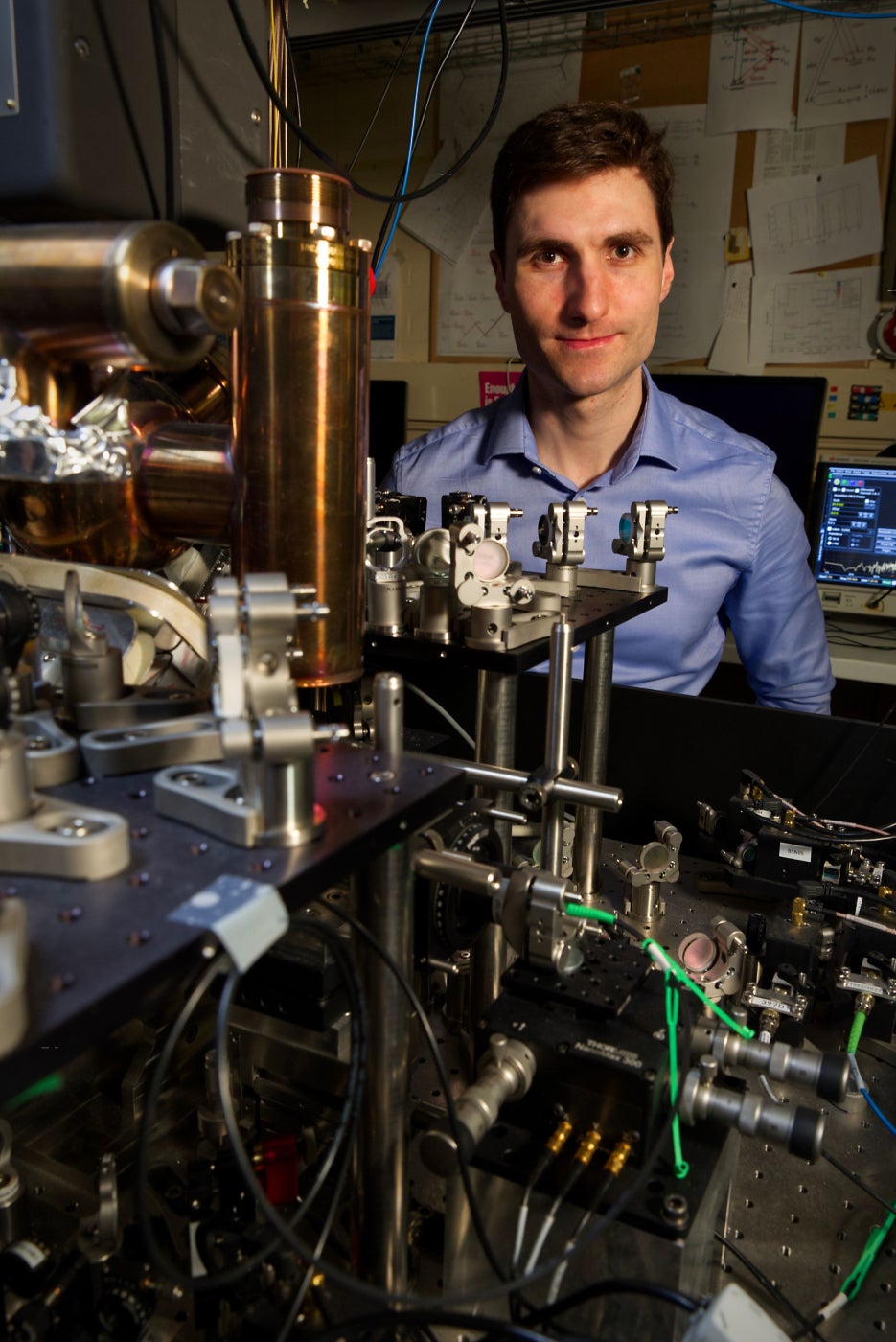Enterprises are one step closer to quantum cloud computing thanks to a breakthrough made by Oxford University scientists in the security and privacy of quantum cloud computing.
The researchers used a method called “blind quantum computing” to connect two quantum computing entities (Figure A); This simulates a situation where employees at home or in the office remotely connect to a quantum server through the cloud. With this approach, the quantum server provider does not need to know any details of the calculations to be performed, thus ensuring the security of users’ proprietary work. Users can also easily verify the authenticity of their results, confirming that they are neither errors nor corruption.
Figure A

Ensuring the security and privacy of quantum computing is one of the most significant obstacles to the development of this powerful technology to date, so this work could lead to its eventual entry into the mainstream.
Although only tested on a small scale, the researchers say their experiments have the potential to scale up to large-scale quantum computing. Plug-in devices can be developed to protect workers’ data when accessing quantum cloud computing services.
Professor David Lucas, co-leader of the physics research group at the University of Oxford, said in a press release: “For the first time, we have demonstrated that quantum computing in the cloud can be accessed in a scalable and practical way, which will also provide convenience for people.
What is quantum cloud computing?
Classical computers process information as binary bits represented as ones and zeros, but quantum computers use quantum bits, or qubits, to process information. A qubit exists as both a 1 and a 0, but the chance of being one or the other is determined by its quantum state. This property allows quantum computers to handle certain calculations faster than classical computers because they can solve problems simultaneously.
Quantum cloud computing provides quantum resources to users remotely through the Internet; this allows anyone to take advantage of quantum computing without requiring specialized hardware or expertise.
Free Download: Quantum Computing: An Insider’s Guide
Why is “blind quantum computing” safer?
For typical quantum cloud computing, users must disclose to the cloud provider the problem they are trying to solve; this is because the provider’s infrastructure needs to understand the specifics of the problem so that it can allocate appropriate resources and execution parameters. Of course, in the case of proprietary work, this creates security issues.
This security risk can be minimized through the blind quantum computing method, because the user remotely controls the quantum processor of the server itself during the calculation process. The information needed to keep data secure (such as inputs, outputs, and algorithm details) only needs to be known by the client, as the server does not use it to make any decisions.
“At no time in history have issues surrounding the privacy of data and code been debated with such urgency as in today’s era of cloud computing and artificial intelligence,” Professor Lucas said in a press release.
“As quantum computers become more powerful, people will seek to use them online with complete security and privacy, and our new results mark a step forward in this ability.”
How does quantum computing impact business?
Quantum computing is far more powerful than traditional computing, and if it successfully moves beyond the research phase, it could revolutionize the way we work. Such as solving supply chain issues, optimizing routes and ensuring communications security.
In February, the British government announced a 45 million pound ($57 million) investment in quantum computing; the funds will be used to find practical uses for quantum computing and create a “quantum economy” by 2033. Development of technology and promotion of collaboration between academia and industry. Just this month, the UK’s second commercial quantum computer came online.
There are currently few commercially available quantum computers due to their extensive power and cooling requirements. However, some leading cloud providers do offer so-called quantum-as-a-service to enterprise customers and researchers. For example, Google’s Cirq is an open source quantum computing platform, while Amazon Braket allows users to test their algorithms on a local quantum simulator. IBM, Microsoft and Alibaba also offer quantum-as-a-service offerings.
Watch: What Classical Software Developers Need to Know About Quantum Computing
But before quantum computing can be scaled up and used in commercial applications, it must be ensured that this can be achieved while protecting the privacy and security of customer data. That’s what researchers at the University of Oxford hope to achieve in their new study, published in Physical Review Letters.
“Strong security will lower the barriers to using powerful quantum cloud computing services and, once available, will accelerate the development of new technologies such as batteries and drugs involving highly confidential data,” study leader Dr. Peter Dmota told TechRepublic in an email. The presence of these applications, such as private medical information, intellectual property, and defense, also does not increase security, but is unlikely to be widely used.
“Quantum computing has the potential to vastly improve machine learning. This will lead to the development of better, more adaptable artificial intelligence, which we are already seeing impacting business across industries.
“It is conceivable that quantum computing will have an impact on our lives within the next five to ten years, but it is difficult to predict the exact nature of future innovations. I expect that as users begin to learn how to use this new tool and how to apply it to themselves There will be an ongoing process of adaptation in the workplace – just as artificial intelligence is now slowly becoming more important in mainstream workplaces.
“Our research is currently driven by fairly general assumptions, but as companies begin to explore the potential of quantum computing, more specific requirements will emerge and push research in new directions.”
How does blind quantum cloud computing work?
Blind quantum cloud computing requires the use of fiber optic cables to connect a client computer capable of detecting photons or light particles to a quantum computing server (Picture B). The server generates single photons, sends them over the fiber optic network and is received by the client.
Picture B

The client then measures the polarization, or direction, of the photon, which tells it how to operate the server remotely in a way that produces the required calculations. This can be done without the server needing to access any information about the calculation, making it secure.
To further ensure that the calculation results have not been erroneous or tampered with, additional tests can be performed. While tampering does not compromise the security of the data in blind quantum computing, it can still corrupt the results and keep the client unaware.
“The laws of quantum mechanics do not allow copying of information, and any attempt by a server or eavesdropper to observe the state of a memory would disrupt the computation,” Dr. DeMotta explained to TechRepublic in an email. “In this case, users will notice that the server is not functioning properly, using a feature called ‘verification’, and if there is any doubt, use their service.
“Because the server is ‘blind’ to computations—that is, unable to distinguish between different computations—clients can assess the server’s reliability by performing simple tests, the results of which can be easily checked.
“These tests can be intertwined with actual calculations until there is sufficient evidence that the server is functioning properly and the results of the actual calculations can be trusted to be correct. This way, clients can detect honest errors as well as malicious attempts to tamper with the calculations.
Figure C

What did researchers discover through blind quantum cloud computing experiments?
According to the paper, the researchers found that their method produced calculations that “can be robustly and reliably verified.” This means the client can trust that the results have not been tampered with. It is also scalable, as the number of quantum elements used to perform calculations can be increased “without increasing the number of physical qubits in the server or modifying the client hardware,” the scientists wrote.
“Using blind quantum computing, customers can access a remote quantum computer, process confidential data with secret algorithms, and even verify that the results are correct, without revealing any useful information,” Dr. Drmota said in the press release. Enabling this concept is quantum A huge step forward in computing and ensuring the security of our online information.
The research was funded by the UK Center for Quantum Computing and Simulation, a 17-university collaboration with support from commercial and government organizations. It is one of four quantum technology centers part of the UK’s National Quantum Technologies Programme.
